New polling reveals broad frustration with the pharmaceutical industry and insurers.
As the Make America Healthy Again (MAHA) movement continues to influence health policy debates in Washington, new polling from Change Research reveals significant bipartisan concerns about corporate influence in health care, even as Americans remain divided over who they trust to fix the system.
The survey of 2,200 registered voters, conducted September 28-October 6, 2025, as part of Change Research’s internal Compass Poll series, which informs the Change Research Data Portal, captures both bipartisan anger and deep ideological divides in how Americans think about health, science, and trust.
Led by Health and Human Services Secretary Robert F. Kennedy Jr., the MAHA movement has elevated concerns about pharmaceutical influence and food safety. Yet its skepticism toward vaccines and other public health measures has drawn criticism from medical professionals who see it as blurring the line between reform and misinformation.
MAHA: Mostly a Partisan Brand
Despite significant federal policy initiatives and media attention, the MAHA movement itself remains unfamiliar to many Americans, with awareness varying considerably across partisan lines. Republicans show notably higher recognition than Democrats or independents.
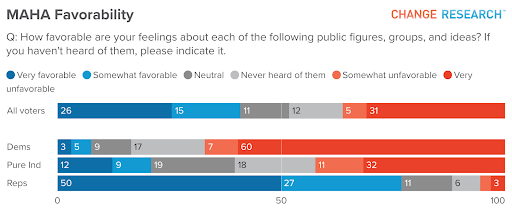
Among those who have heard of MAHA, opinions split sharply along partisan lines.
Bipartisan Anger at the Health Care System’s Beneficiaries
Eighty-eight percent of Americans agree that “the health care system often helps drug companies, hospitals, and insurers more than patients.” It’s a rare point of unity, shared by 83% of Democrats, 89% of independents, and 91% of Republicans.
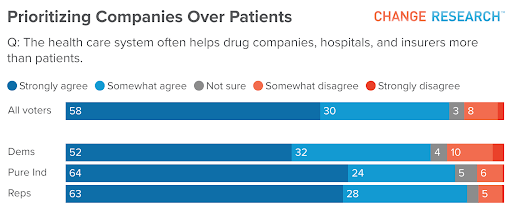
Racial differences show varying levels of agreement but the same general conclusion. Black Americans are the most likely to agree that the system prioritizes the interests of drug companies, hospitals, and insurers (94%), followed by white (88%), Asian (85%), and Hispanic (79%) Americans.
That skepticism extends to the way health risks are communicated. Three in four Americans (76%) believe “the government and drug companies are not always clear in communicating the risks for medicines,” including 66% of Democrats, 76% of independents, and 86% of Republicans.
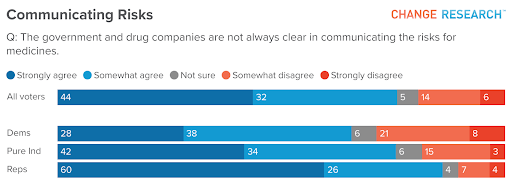
Health concerns also reach beyond the doctor’s office. Eighty-eight percent agree that “chemicals in food and the environment may be a bigger health risk than people think.” Agreement is strongest among Republicans (95%), with broad alignment among independents (88%) and Democrats (82%).
Big Pharma’s Advice Not Wanted
Just 16% of Americans say they trust pharmaceutical companies “a lot” or “some” to provide accurate medical advice, while 80% trust them “a little” or “not at all.”
This represents one of the lowest trust ratings among all sources tested, trailing doctors and OB-GYNs (82% trust), pharmacists (71%), and even online medical resources (53%). Republicans and independents express the least trust (both 11%), while Democrats show only modestly higher confidence (22%).
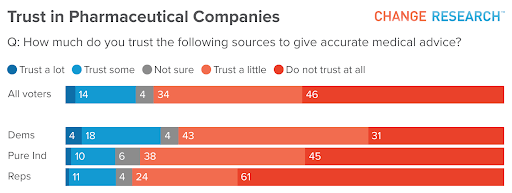
Too Much Medicine
Nearly seven in ten Americans (69%) believe “Americans use prescription drugs too often.” That topline hides a significant partisan gap: 86% of Republicans agree, compared with 68% of independents and 53% of Democrats.
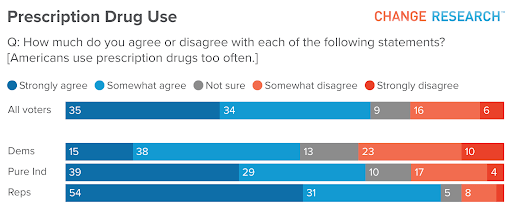
Women are slightly more likely than men to agree (74% vs. 66%).
Doctors Still Trusted, Even as Institutions Struggle
Doctors and OB-GYNs command the highest trust ratings in the survey, with 82% of respondents trusting them “a lot” or “some” for medical advice.
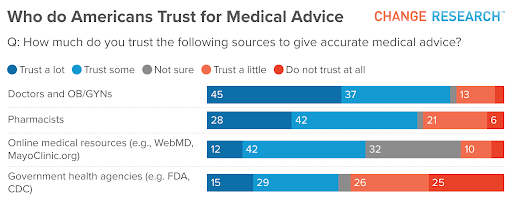
That trust runs strongest among Black Americans (94%), followed by Hispanic (82%), Asian (80%), and white respondents (77%). Partisan divides are visible but not overwhelming: 92% of Democrats trust doctors, compared with 75% of independents and 73% of Republicans.
Pharmacists also rank highly, earning trust from 71% of Americans. Online medical resources like WebMD fall in the middle at 53%, suggesting that while people seek out digital information, they still rely most on human expertise.
Government health agencies like the FDA and CDC occupy a more complicated middle ground, trusted by 44% overall, far below doctors but well above pharmaceutical companies. Here, the partisan divide is sharp: 59% of Democrats trust these agencies, compared with 41% of independents and just 30% of Republicans, a 29-point gap. Younger Americans (18–34) show higher trust of government health agencies at 50% compared to 41% of those 65 and older.
When Politicians Play Doctor
Few Americans want medical advice from political leaders. Just 25% say they trust figures like Donald Trump or Robert F. Kennedy Jr. “a lot” or “some,” while 73% say they trust them “a little” or “not at all.”
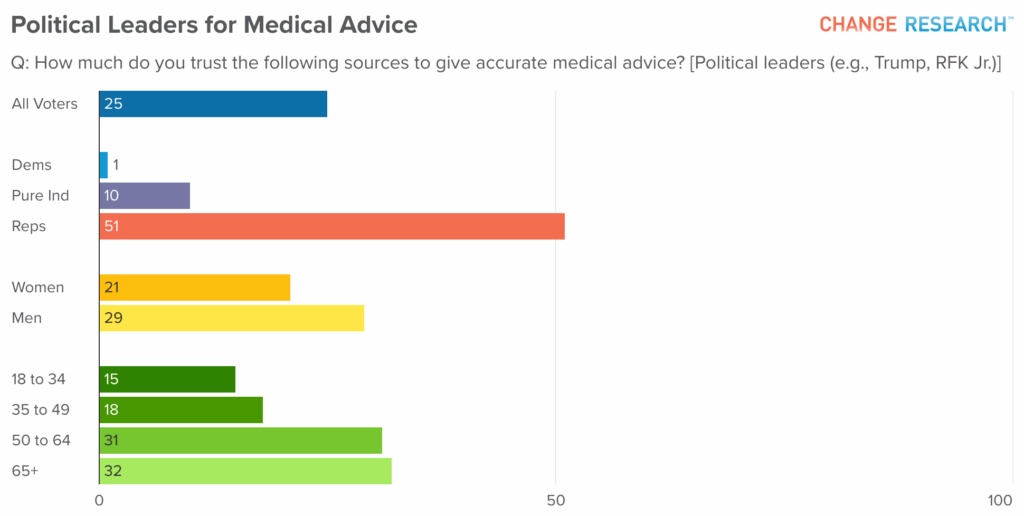
Partisan divides drive much of that difference: 51% of Republicans express some trust in political leaders on health issues, compared with just 10% of independents and 1% of Democrats.
Age and gender show smaller but notable variations. Older Americans (32% of those 65 and older) are more likely than younger adults (15% of those 18–34) to trust politicians for health guidance. Women are slightly more trusting than men (29% vs. 21%), though skepticism is widespread across all groups.
The Battle Over Medical Expertise
When asked whether “people should not rely only on official medical advice,” 49% agree while 45% disagree, revealing one of the survey’s most dramatic partisan splits. Two-thirds of Republicans (66%) agree, compared with 39% of independents and just 33% of Democrats.

Skepticism rises with age, with 56% of seniors agreeing compared to 41% of younger adults. Across racial groups, Asian Americans (52%) and Hispanic Americans (51%) are most likely to question exclusive reliance on official guidance, followed by Black (46%) and white respondents (43%).
What Americans Think Shapes Health Most
Americans see health as the product of many forces, not a single factor. Nearly half (49%) say individual choices, access to care, and genetics matter “all about equally.” Another 26% emphasize access to medical care and treatments as most important, while 20% point to personal choices like diet, exercise, and lifestyle.
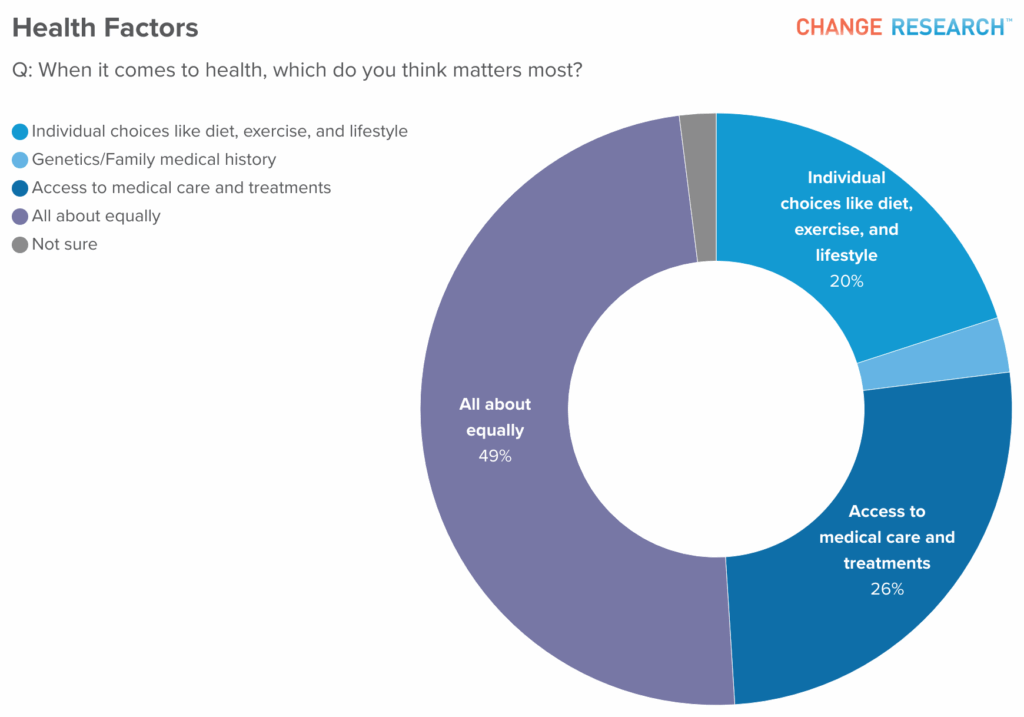
This mix of perspectives suggests Americans see health as multifaceted, potentially complicating messaging from any movement emphasizing a single approach.
The Wellness Divide
Familiarity with wellness trends varies widely. Running is most familiar to respondents, with 67% reporting they have tried it or do it regularly. Yoga remains a familiar fixture, with nearly half (49%) reporting similar engagement. Guided breathing is just behind yoga, with 47% saying they have tried the practice. Intermittent fasting also ranks high, with 45% of Americans saying they’ve tried it or practice it regularly.
Beyond these common practices, participation drops. Just 20% have used weighted vests while exercising, 17% have tried ice baths or cold plunges, and only 12% have experienced cryotherapy.
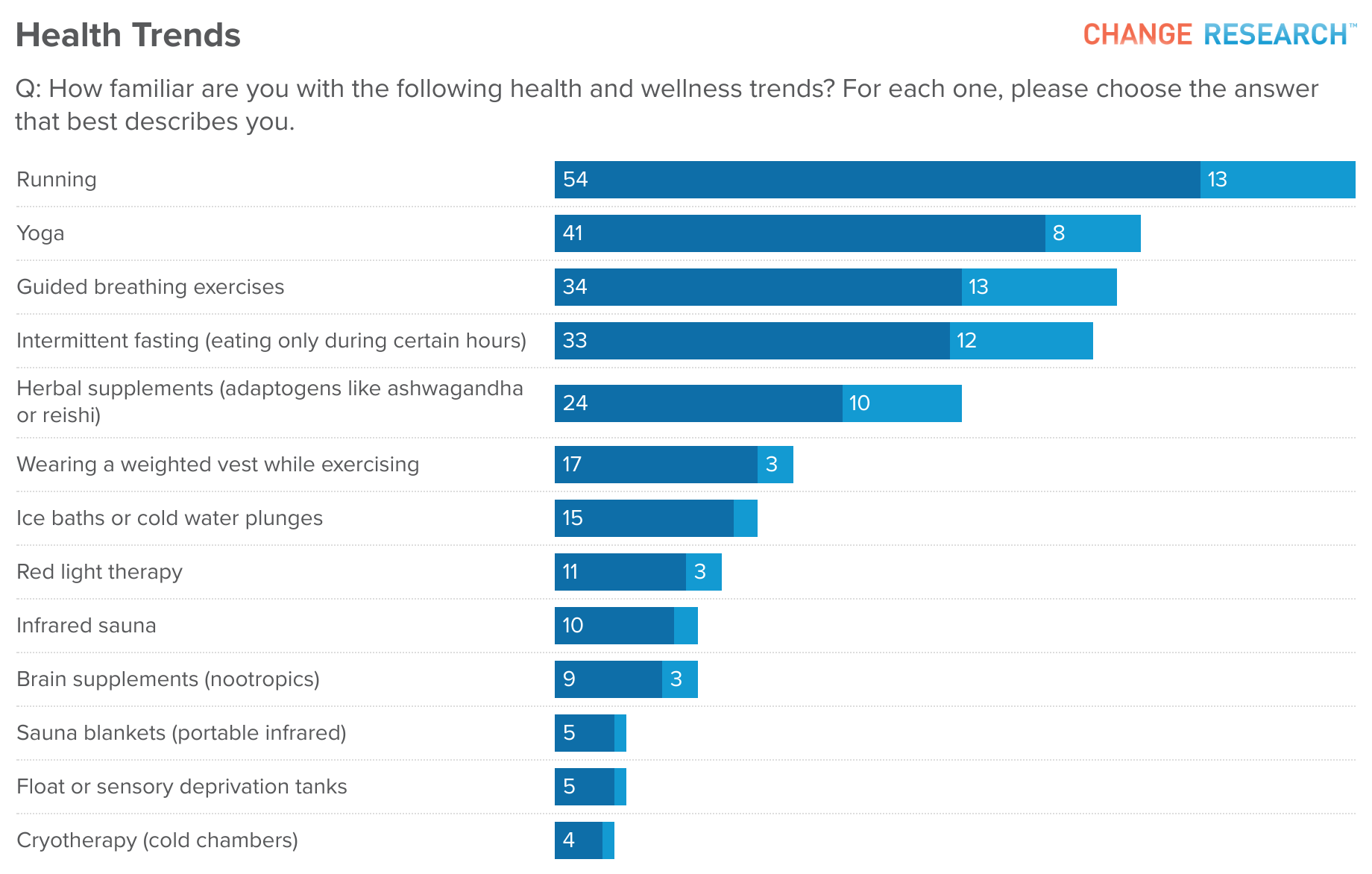
Herbal supplements such as adaptogens (ashwagandha, reishi) fall in the middle, with about one-third of Americans (34%) having tried them.
Between Reform and Rejection
The Make America Healthy Again (MAHA) movement has brought new attention to issues like drug pricing, food additives, environmental toxins, and corporate influence over regulators. At the same time, its embrace of scientifically disputed claims about vaccines and public health has blurred the line between reform and hyperbole for many voters.
Many Americans see health as shaped by both personal and systemic factors, suggesting space for policy solutions that improve the process for regulatory approval, expand access, drive down costs, and uphold scientific integrity, without alienating those wary of government intervention.
